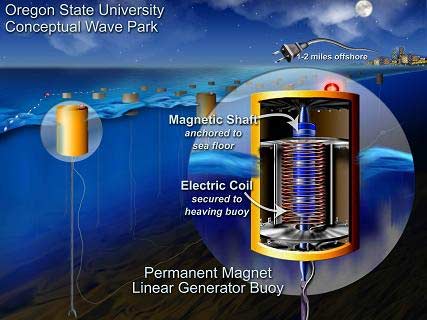For years, the United States has looked to the sun and the wind as renewable energy sources. But legislation moving through Congress would authorize $250 million in federal grants to develop ocean wave energy.
The measure would be the nation's first major investment in wave energy, which converts the rise and fall of ocean swells into electrical power. A related technology, tidal energy, extracts energy from the movement of the sea's tides.
Wave energy "has the potential of delivering about 10 percent of our energy, which is a huge amount," said Rep. Darlene Hooley, D-Ore., author of the bill, which received bipartisan support in the House Science Committee and was included in a pending energy bill.
Developing wave energy also has the support of the electric power industry, said Jim Owen, spokesman for Edison Electric Institute, which lobbies for investor-owned utilities. "We're looking at the full range of renewable options," he said.
Hooley's home state has positioned itself as a potential national leader in the field of wave energy. Some of the most substantive wave energy research in the United States is being conducted at Oregon State University. And, earlier this year, the Portland-based Pacific Northwest Generating Cooperative announced it was developing a wave energy project off the Oregon coast.
"Oregon has a very well-suited coastline for wave energy," said Annette von Jouanne, an electrical engineering professor at Oregon State who leads its wave energy research. "Pretty much all of it has good strong wave energy potential."
Von Jouanne praised Hooley's legislation as a necessary step to develop the technology.
"We are severely lagging behind other countries such as Europe in federal government investments," she said. "This type of bill is exactly what we need."
Some critics say federal money can be better used to develop more proven alternative energy sources, such as solar and wind.
"It may be worth exploring, but I don't think it's the highest priority to put our money," said Arno Penzias, who won the Nobel Prize in physics in 1978 and is now a venture capitalist.
Von Jouanne cites studies suggesting wave energy could become as cost-effective as wind energy, "if we put in the amount of research and development that's necessary.
"Right now we're 20 years behind wind," she said. "We're in the very preliminary stages. Because of the advanced technologies, we can catch up."
Hooley acknowledges that researchers must find a generation method that is reliable and not too costly.
"We have to first of all do research and development to see if it works, how well it works, can you get it on the grid, can you do it without having an impact on the environment or on other competing interests like fisheries," Hooley said. "And can you do it efficiently? There is some energy that costs as much to produce as if you didn't. We're trying to make sure it's cost-efficient."

